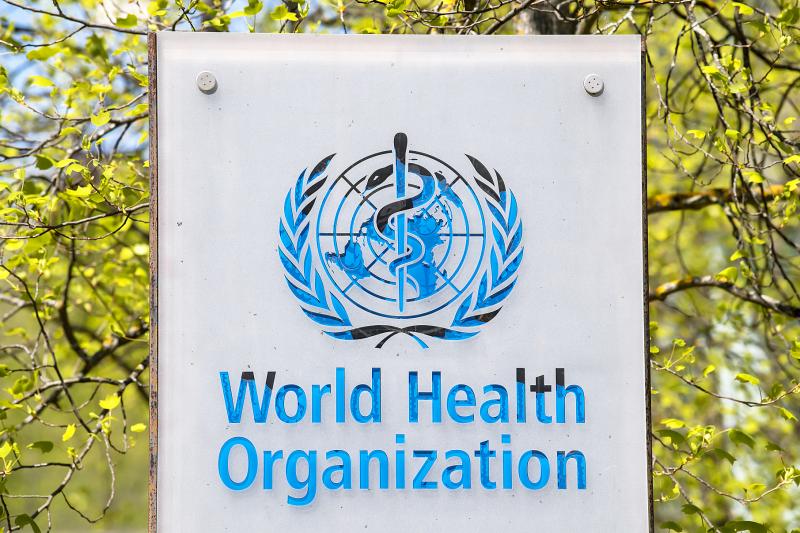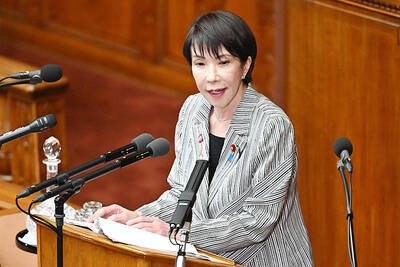The American Institute in Taiwan (AIT) yesterday launched a “countdown” series of Facebook posts to promote Taiwan’s bid to participate in the World Health Assembly (WHA), which is expected to meet virtually in the middle of this month.
The WHA, the WHO’s decisionmaking body, takes place in Geneva, Switzerland, every year, but Taiwan, which took part in the assembly as an observer from 2009 to 2016, has not been invited since President Tsai Ing-wen (蔡英文) of the Democratic Progressive Party (DPP) took office.
“The US firmly believes Taiwan has a role to play in global health and should be invited to observe the World Health Assembly later this month,” the AIT wrote on Facebook yesterday. “The inclusion of Taiwan in the #WHA would contribute to the goal of #HealthForAll and help Taiwan share the successful #TaiwanModel of COVID-19 prevention with the world.”

Photo: EPA-EFE
“Each day from now until the #WHA, we will be sharing posts supporting Taiwan’s participation in the WHA and greater participation on the global stage,” it wrote.
The WHO’s Executive Board on Thursday approved a plan to hold the assembly as a videoconference starting on May 18 and possibly ending the next day, although its Web site still shows the meeting is scheduled from May 17 to 21 in Geneva, a Ministry of Foreign Affairs official said yesterday on condition of anonymity.
The WHO secretariat would brief delegations of member states and release more details soon, the official said.
Separately, a report by Foreign Policy published on Wednesday said that the administration of US President Donald Trump is seeking to enlist the support of key allies to restore Taiwan’s status as an observer at the WHA, “setting the stage for a fresh confrontation with China as the world struggles to contain the coronavirus pandemic.”
The US and Japan are asking key like-minded countries, including Australia, the UK, France and Germany, to sign a letter to WHO Director-General Tedros Adhanom Ghebreyesus, asking him to invite a Taiwanese delegation to the WHA, the magazine reported.
Minister of Health and Welfare Chen Shih-chung (陳時中) and US Secretary of Health and Human Services Alex Azar on Monday had a nearly 30-minute telephone conversation about the pandemic and Taiwan’s bid to join the WHO, the ministry said.
Taiwan, the US and Japan on Wednesday hosted a virtual workshop on counteracting disinformation campaigns related to the pandemic.
While Chen on Wednesday told lawmakers that Taiwan’s chances to speak at this year’s WHA might be less than 50 percent, Taiwanese are pushing the nation’s bid.
In a statement published on the International Democrat Union’s Web site on Thursday, Chinese Nationalist Party (KMT) Chairman Johnny Chiang (江啟臣) highlighted the nation’s achievements in containing the pandemic with its high-quality public health system and experience dealing with the SARS outbreak in 2003.
While Chiang spent time criticizing the DPP administration’s relief policy, he said: “The zealous desire of the people of Taiwan to participate in and contribute to the WHO should be respected and supported by the authorities in Beijing and the rest of the world.”
Taiwan’s participation in the WHO can better realize the organization’s constitutional goal of promoting “the attainment by all peoples of the highest possible level of health,” Chiang wrote.
“Taiwan needs the WHO just as much as the WHO needs Taiwan to fight the [novel] coronavirus and future epidemics,” he wrote.
The Australian Office in Taipei yesterday on Facebook wrote its support for Taiwan to join the WHO and participate in the WHA as an observer, adding that the WHO should cooperate closely with all health authorities to combat the pandemic.

Taiwan’s exports soared to an all-time high of US$61.8 billion last month, surging 49.7 percent from a year earlier, as the global frenzy for artificial intelligence (AI) applications and new consumer electronics powered shipments of high-tech goods, the Ministry of Finance said yesterday. It was the first time exports had exceeded the US$60 billion mark, fueled by the global boom in AI development that has significantly boosted Taiwanese companies across the international supply chain, Department of Statistics Director-General Beatrice Tsai (蔡美娜) told a media briefing. “There is a consensus among major AI players that the upcycle is still in its early stage,”

The Central Weather Administration (CWA) yesterday said it expected to issue a sea warning for Typhoon Fung-Wong tomorrow, which it said would possibly make landfall near central Taiwan. As of 2am yesterday, Fung-Wong was about 1,760km southeast of Oluanpi (鵝鑾鼻), Taiwan’s southernmost point, moving west-northwest at 26kph. It is forecast to reach Luzon in the northern Philippines by tomorrow, the CWA said. After entering the South China Sea, Typhoon Fung-Wong is likely to turn northward toward Taiwan, CWA forecaster Chang Chun-yao (張峻堯) said, adding that it would likely make landfall near central Taiwan. The CWA expects to issue a land

‘SECRETS’: While saying China would not attack during his presidency, Donald Trump declined to say how Washington would respond if Beijing were to take military action US President Donald Trump said that China would not take military action against Taiwan while he is president, as the Chinese leaders “know the consequences.” Trump made the statement during an interview on CBS’ 60 Minutes program that aired on Sunday, a few days after his meeting with Chinese President Xi Jinping (習近平) in South Korea. “He [Xi] has openly said, and his people have openly said at meetings, ‘we would never do anything while President Trump is president,’ because they know the consequences,” Trump said in the interview. However, he repeatedly declined to say exactly how Washington would respond in

Japanese Prime Minister Sanae Takaichi said yesterday that China using armed force against Taiwan could constitute a "survival-threatening situation" for Japan, allowing the country to mobilize the Japanese armed forces under its security laws. Takaichi made the remarks during a parliamentary session yesterday while responding to a question about whether a "Taiwan contingency" involving a Chinese naval blockade would qualify as a "survival-threatening situation" for Japan, according to a report by Japan’s Asahi Shimbun. "If warships are used and other armed actions are involved, I believe this could constitute a survival- threatening